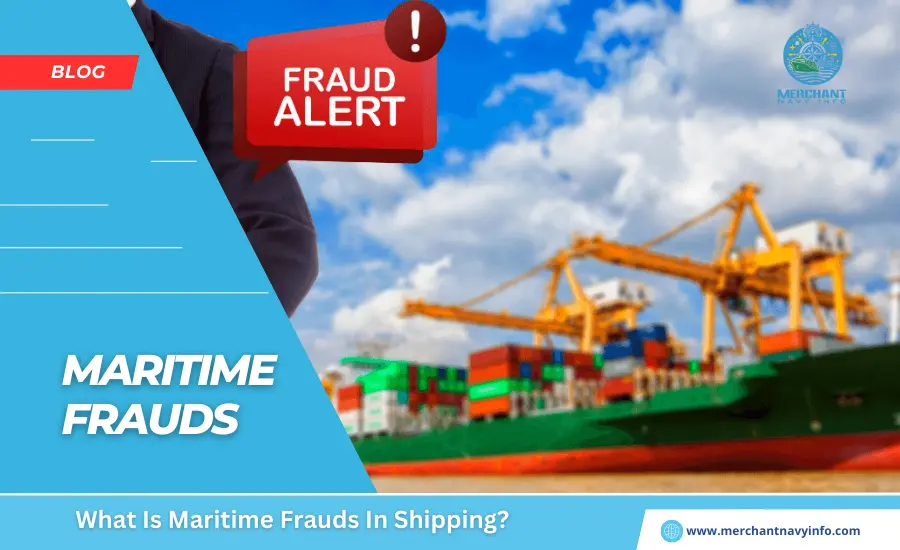
Maritime Frauds: The ship is almost 99% loaded with crude oil. The B/L number the ship provides will be less than 98% of the total cargo. More than 1% of this cargo will be sold to small barges organized by the facility off the coast of maritime nations in the Arabian Sea. The spoils are divided equally among everyone on board and land. When I told him something like this could not happen on my ship, he was very disappointed and left after a few weeks.
Have you ever faced food problems, pay problems, seizure of a ship, or engine damage? Coercion by senior officers, abandonment by shipowners, etc. Well, these are the many seafarers on ships worldwide. These are just some of the many problems people face.
The main reason for these problems is greed, a global phenomenon. Corrupt captains, chief engineers, senior officers. Ship supervisors can make life miserable for the crew by acting alone or colluding with other shore forces if coastal managers are leading corruption. It is time to leave the company and report such maritime fraud cases to the authorities.
What Exactly Is Maritime Frauds?
And how do you recognize it? Maritime fraud can happen anywhere, whether it’s a ship, a shipping company’s office, or a trading company that transports goods by sea. The list goes on. Surely, he must involve two or more parties, one or more of whom must have improperly. Or illegally obtained goods or services from another party. Such situations can occur anywhere, so seafarers.
Avoid directly or indirectly interfering with operations or forcing senior officers to engage in misconduct that could cause financial and reputational damage. It is important to be especially careful. The International Maritime Bureau, or IMB, was established in 1981 as a specialized division of the International Chamber of Commerce (ICC) to detect, inform, and combat such maritime fraud.
It is a Non-Profit Organization.
Even the IMO, in its resolution A 504(XII) (5) and (9) adopted on 20 November 1981, issued a directive to governments, organizations, and stakeholders to combat maritime fraud worldwide. We encourage cooperation and information exchange.
We hope that all seafarers are already aware of her Malaysia-based IMB Piracy Reporting Center and that they regularly receive global piracy reports on board their ships. Some maritime fraud cases are visible and easily discovered, while others remain hidden for long periods due to insufficient evidence.
Types Of Maritime Frauds Here’s What You Can Easily See On Board:
- The captain and chief steward manipulate transactions by signing for unclaimed goods or sharing the spoils with suppliers and issuing invoices.
- A senior deck officer and a ship’s crew member who sells the ship’s stores and cargo.
- A senior marine engineer manipulates shortages by selling bunkers and leaving cargo (diesel) in oil tankers by supplying more fuel to ships at a lower price.
- The Senior Marine Engineer agrees to accept replacement parts for inferior machinery.
- Senior Deck Officer operates B/L No.
- Ship supervisors, alone or in conjunction with senior deck officers, inflate invoices with supplies/spares and repair work not performed in the yard.
- Cargo inspectors work with senior deck officers and manipulate daily results to improve ratings. This is most common on bulk carriers.
- Agents, longshoremen, and suppliers work with senior executives on board to manipulate invoices.
- Seafarer agents manipulate seafarers’ salaries.
- Crew agencies use fake certificates, CDCs, etc. To bring non-certified crew members on board at low wages.
- Senior officers on board manipulate figures from oil logs to hide defects in the ship’s machinery and pump residue overboard through portable hoses.
- A senior deck officer works with the ship’s owners and managers to operate the oil tanker’s cargo count and pump tailings (diesel) into the bunker tanks.
- The ship’s crew and master intentionally and illegally transport a stowaway.
- Crew and captain of a ship carrying contraband on board.
- Insurance maritime frauds by ship owners/managers who falsified ship records in conjunction with crew members and masters.
Included
This may include deaths on board (murders are reported as suicides). I could go on, but seafarers must remain vigilant in their interests. Please be alert and identify several other cases of this type of maritime fraud that are not listed and bring them to the attention of port authorities. Whistleblowers are rewarded handsomely, as with the third engineer who provided the U.S. The Coast Guard has substantial evidence of wrongdoing by the chief engineer that caused environmental pollution years ago. The chief engineer received a long sentence, but the junior engineer received $1 million, and the U.S.
Citizenship
Today’s seafarers have many opportunities to gather evidence against wrongdoings committed on board. One is intrinsically safe explosion-proof cameras for various spy devices in hazardous environments and indoors. From false bottoms and also defective tracking tapes provided by bunker vessels to bunker delivery notes and various stores/supplies provided to vessels, increased vigilance and awareness can prevent many maritime fraudulent activities.
Never allow older people to be intimidated or coerced over environmental issues. Any quality problems or deficiencies should be reported to the captain, and she must have at least two crew members countersign all invoices received on board.
Suspicious
Finally, report any suspicious crew member behavior to your supervisor. It is important to remember that any ignorance will not help if cheating occurs on board. Because crew members were on board, the incident is presumed to have occurred with the captain’s or crew’s full knowledge unless either reported the incident long before authorities discovered it.
Although the main reason for such maritime fraud is primarily greed, maritime fraud at sea is often caused by senior officers or outsiders coercing the crew or by the captain’s company personnel, ship owners, agents, ports, etc. It can also occur due to administrator enforcement and criminal organizations.









